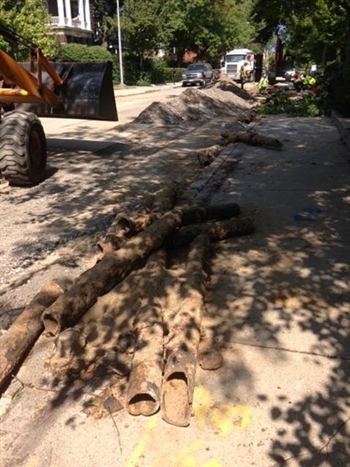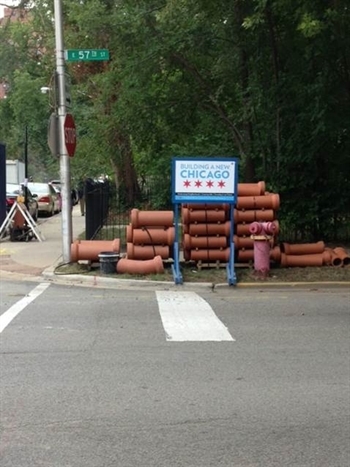
Metra over Fox River.
 By Abby Crisostomo and MPC Research Assistant Rachel Carnahan
By Abby Crisostomo and MPC Research Assistant Rachel Carnahan - September 23, 2013
This is the question of the hour in water conservation. Less water used means less water sold and often means less revenue collected; less revenue collected can mean less money for the operation and maintenance of the water system. At the last workshop of four in the DuPage Water Commission water management workshop series, we discussed some financing and rate structure options available to utilities to reduce the impact water conservation has on their budgets.
The DuPage Water Commission, Metropolitan Planning Council (MPC), Chicago Metropolitan Agency for Planning and MWH Global collaborated to host this workshop series, geared toward public works employees, to get ideas and advice on programs to implement in their municipalities. These workshops have been an opportunity for MPC to get involved in DuPage County and help public works employees in the region start thinking about water conservation. The first workshop focused on utility planning and asset management in the context of water management operations, the second focused on regulations and ordinances to aid water conservation in the DuPage Water Commission region and the third workshop focused on practical indoor and outdoor water conservation methods.
Margaret Schneemann from the Illinois-Indiana Sea Grant and Chicago Metropolitan Agency for Planning addressed this issue head on. She repeated a common theme from these workshops; full-cost pricing needs to be implemented in every community. Full-cost pricing, which has been endorsed by the American Water Works Association, means that the utility charges a fixed fee to cover long-run costs and a variable fee that is based on how much the customer uses to pay for short-run costs. This allows the utility to have their fixed costs covered, even if the customer is carrying out conservation measures.
Conservation can actually save the utility money. Decreased demand means less water to pump, which translates into lower operating costs and capital costs. Margaret says that the key is to set your rates to reflect the decreasing demand so that the utility does not lose money. This means utilities need to accurately forecast demand, even if it is predicted to decrease, and to price accordingly with full-cost pricing. This rate structure can be unpopular with people who use little water, like the elderly. The City of Aurora, for example, offers a senior exemption of the base rate based on their property taxes to solve this concern.
A big problem for communities in the Chicago region is that they have aging systems that need replacing. The upgrades they need are costly and most utilities cannot cover them out of their operating budgets, even if they use full-cost pricing. Gerry Bakker and Andy Bielanski from the U.S. Environmental Protection Agency (EPA), District 5 office discussed some of the more conventional funding sources for capital projects. One option is to apply for a loan from the Drinking Water State Revolving Fund (SRF). Each state receives a grant through this program and must match 20 percent of the grant. The fund is then loaned out to municipalities for water system upgrades and consolidation through the state Environmental Protection Agency. Illinois’s allocation is about $31.8 million but through the governor’s Clean Water Initiative, the state of Illinois is planning to bond for an additional $1 billion to add to the fund.

Old pipes that are being replaced in the Hyde Park neighborhood of Chicago. Chicago has undertaken an ambitious project to replace the 900 miles of pipe in the city that are over 100 years old. These pipes date back to 1892.
Rachel Carnahan

New pipes waiting to be installed in Chicago.
Rachel Carnahan
Ted Hammer from KPMG presented some non-traditional options for funding. He suggested looking to the private sector for funding sources through mechanisms like operation and maintenance contracts or a DBFO contracts. An operation and maintenance contract can be anywhere from 5 to 20 years and would consist of a private entity running the utility or an aspect of the system for that period. A DBFO contract, which stands for design, build, finance and operate, is a public-private partnership where these responsibilities are transferred to the private firm but ownership remains with the public utility.
Ben Disney from Ameresco and McGee Young from Marquette University presented two more tools for municipalities to save water and money. Ben talked about performance contracting, which is the use of savings from making a utilities' operations more efficient as capital to make needed upgrades, financed over a period of time. Firms like Ameresco help utilities with performance contracting by guaranteeing they will save a certain amount of money and then use that money to finance improvements in a way that covers the costs of the improvements. McGee Young is the founder of H2O Score, which is a tool that allows water users to see how their water use compares with their neighbors’, giving them information to make personal water conservation choices. Utilities can work with H2O Score to provide this service to their customers.
These tools can help utilities conserve water while covering their maintenance and operation costs. The managers in attendance were receptive to pursuing these programs and ideas in the future. Towns like Aurora and Downers Grove have already moved closer to full-cost pricing. Both towns have a fixed rate and a variable rate and their projections of future demand accurately reflect that demand is decreasing. The town of Glen Ellyn has applied for the state revolving fund loan for the past few years. They said they had a very positive experience. While it took a few years, each year they applied they moved up in the rankings and received helpful feedback on how to improve. These loans are based on need, so as time went on and code became more stringent, they moved up in priority level. These successful uses of the tools and strategies from the workshop proved that they can work in reality and helped encourage the other utilities in attendance to try them out.
Consistent, financially sustainable investments in infrastructure lead to both improved water management and savings in both water and money. The DuPage Water Commission is at the forefront of the water utility community by providing these workshops to their customers. Water conservation in the Midwest is lagging behind the rest of the country because we have a false sense of security that Lake Michigan will always be an ample source of freshwater. However, the Great Lakes have fallen approximately five feet in the last decade. By providing information on conservation in a financially sustainable way, the DuPage Water Commission is furthering their commitment to conserve as part of the Great Lakes Compact.